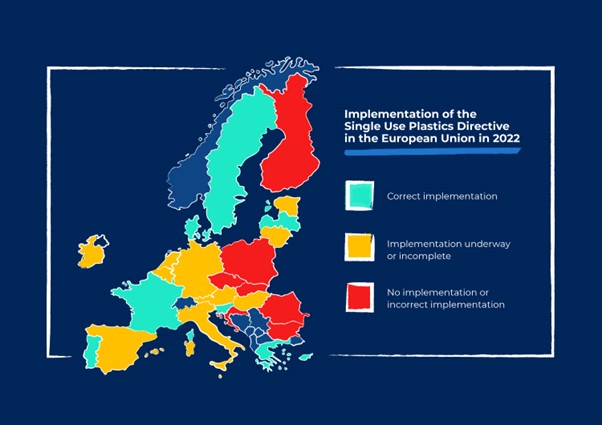NGOs’ report shows progress, failures and remaining gaps in addressing the single-use plastic challenge at national level
Today, the Rethink Plastic alliance and the Break Free From Plastic movement have released an annual assessment (1) tracking the progress scored by EU countries in adopting national measures to phase out single-use plastic, in line with the obligations of the Single-Use Plastic Directive (2). The report reveals that important progress has been made by the majority of EU countries, but significant steps are still expected from national authorities in terms of policy ambition as well as legislative enforcement. In light of the findings, European NGOs call on national governments and the European Commission to play their key role to curb once and for all plastic pollution coming from disposable items.
The report shows that top performers in 2021 (Greece, France, Sweden) were joined in 2022 by Luxembourg, Cyprus, Slovenia, Latvia, Denmark and Portugal. Some of these countries even showed higher ambition than what was required by the EU Directive, notably on measures to achieve consumption reduction. Meanwhile only a couple of laggards (Finland and Poland) remain, with 5 Member States still not showing sufficient ambition (Croatia, Slovakia, Bulgaria, Romania and Czech Republic) or overlooking some of the key measures, such as the Netherlands, Germany, Austria, Estonia, Romania, Hungary or Belgium. In this landscape, some countries stand out for having breached the Directive in their transposition, such as Italy (3) which exempted biodegradable plastics from some of its measures.

*The map shows the ambition gap between top performers leading the transition (highlighted in green), and the countries lagging behind in implementing EU measures to curb single-use plastic (in orange and red). For a full analysis overview, check out our implementation status table on page 8 of the report, highlighting the situation for each Member State measure by measure.
Across all member States, the report shows more efforts are needed on the enforcement of adopted bans, as banned items are still found on the market as a result of greenwashing strategies and stocks being sold off. On consumption reduction, it remains unclear how some countries will achieve this ambitious objective without setting targets, while countries that are investing in and promoting reuse options are those showing most potential for success. Surprisingly, the report also finds that most EU countries did not set national awareness raising strategies and left it to plastic and packaging manufacturers to achieve awareness objectives. On Extended Producers’ responsibility, most countries are still a long way from complying with their obligations in time for 2023 and 2024 deadlines.
“The EU legislation to address single-use plastic pollution has the potential to be world leading. But this will only be possible if governments address the remaining gaps”, said Frédérique Mongodin, Senior Marine Litter Policy Officer At Seas At Risk adding: “For instance, making awareness raising campaigns the responsibility of plastic producers is a mistake. The citizens of tomorrow should not only be able to drop their plastic litter in the right place, but also, and most of all, be informed about and have the option to choose alternatives to single-use. This cultural change cannot be achieved by producers due to an intrinsic conflict of interest.”
Gaëlle Haut, EU affairs coordinator at Surfrider Europe Foundation said: “Member States not only have the responsibility to transpose the Directive but also, to make sure measures they take are implemented in time and enforced. Despite bans being one of the flagship measures introduced by the Directive, banned items could still be found on the EU market. With extended producer responsibility obligations on tobacco around the corner, Member States should also be urgently preparing the systems to be set”.
Larissa Copello, Consumption and Production Campaigner at Zero Waste Europe added: “The obligation for producers to cover certain costs for a series of single-use plastics, through Extended Producer Responsibility (EPR) Schemes, was a major step forward set by the SUP Directive. However, it seems to be the most troublesome measure with many countries lagging behind or with only partial implementation. The correct implementation of EPR schemes is crucial to realise the ‘polluter pays’ principle and should be a priority to Member States, by guaranteeing that producers bear 100% of the clean-up costs for littered single-use plastic items.”
BACKGROUND
In June 2019, the European Union adopted a pioneering legislation to curb plastic pollution: the Single Use Plastics Directive. The measures target the top 10 single-use plastics products polluting beaches in the European Union, which represent the great majority of all marine litter in the EU. As of July 2021, EU countries were expected to have banned several single-use plastic items, labelled certain single-use plastics remaining on the market and started annual awareness raising campaigns. They should also achieve a measurable quantitative reduction in the consumption of single-use plastic cups and food containers by 2026 compared to 2022 and set up extended producer responsibility schemes, as of 2023 for tobacco products and 2024 for other single-use plastic categories.
This report comes less than one year after Surfrider Foundation Europe and the Break Free From Plastic movement launched the S.URe – Single Use Rebellion – campaign which invited all EU citizens to report any plastic forbidden by the SUP directive they could find in their local shops (4).
To inspire public authorities, businesses, schools, NGOs and local communities on how to curb plastic pollution coming from disposable items, Seas At Risk and the Break Free From Plastic movement, have updated with new best practices the multilingual interactive map to phase out disposable plastic items. The 180 solutions hosted on the map have already proved to be effective and can be easily replicated in other regions or developed on a wider scale. (5)
– END –
NOTES TO THE EDITOR:
1. Single Use Plastic Implementation Assessment 2022 Single Use Plastic Implementation Assessment 2021: Moving on from single-use plastics: how is Europe doing? Press release: Single-use plastics pollution: where does Europe stand?
2. The Single-Use Plastic Directive is a EU legislation adopted in 2019.
3. Rethink Plastic alliance and the Break Free From Plastic movement wrote to Italy and reported the Italian government to the EU authorities after its new law on single-use plastics was found to directly contradict EU legislation.
4. The Single Use Rebellion was an EU-wide mobilisation campaign launched by Surfrider Foundation Europe and the Break Free From Plastic movement in September 2021 that invited all EU citizens to report any plastic forbidden by the SUP directive (plates, cutlery, polystyrene boxes, straws, etc) they could find in their local shops on an on-line dedicated platform: www.nosingleuse.org. Following the campaign, a letter was sent to the European Commission to share the evidence from EU citizens that banned single-use plastic items were still in circulation.
5. The multilingual interactive map to reduce and phase out single-use plastics compiles over 180 best practices. These have been collected by Seas At Risk from 27 European countries thanks to the contributions of member and partner organisations. They aim to provide EU countries and national stakeholders with solutions to implement the Single-Use Plastic Directive.
Posted on: 21 September 2022



